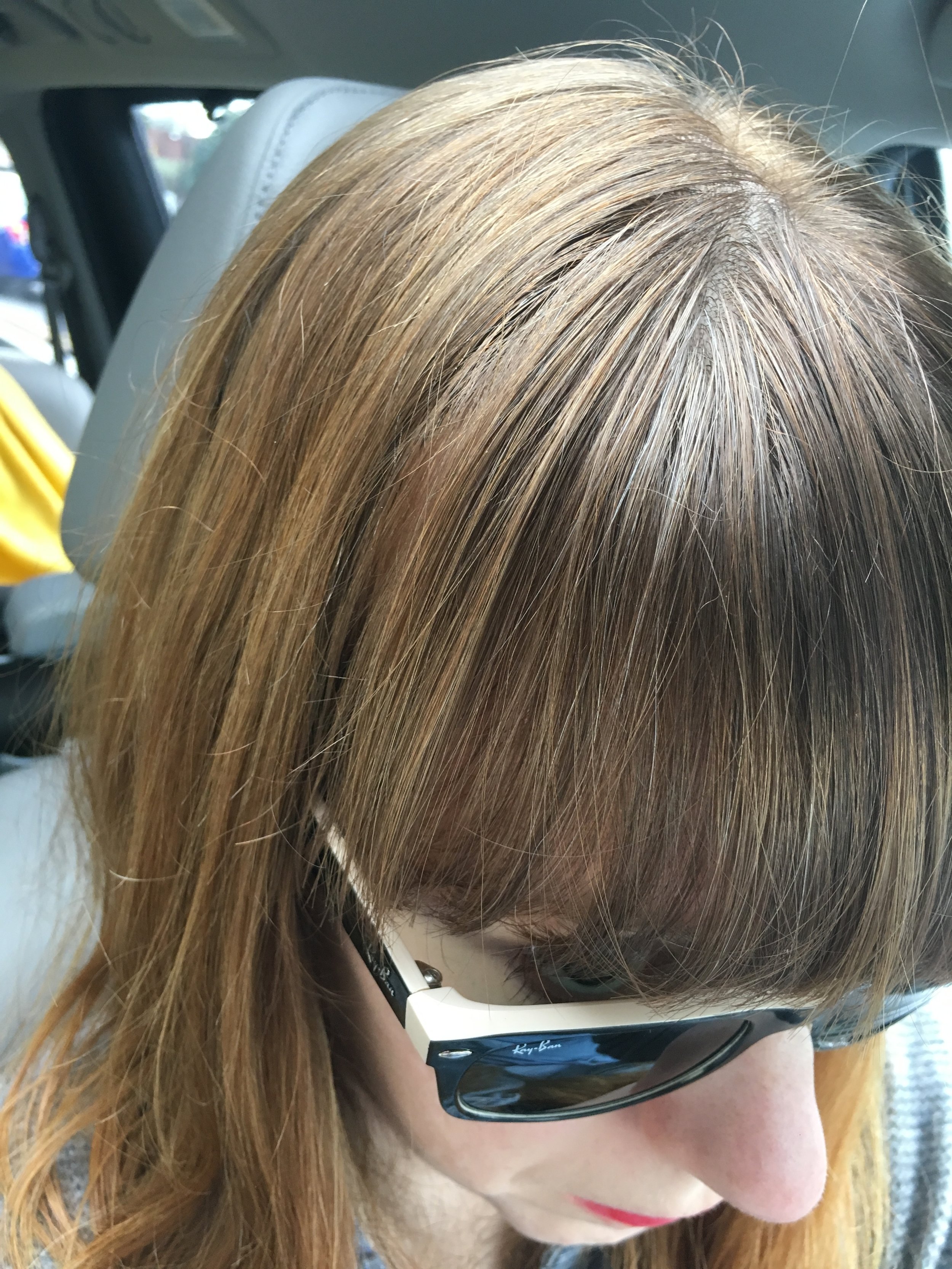Hello, Bluegrass Redhead readers! I'm excited (and nervous) to be sharing in this space. Sarah and I go way back to 2009 when we met through our midwife and had babies within a week of each other. (My second, her first - both boys.) We've been debating current events ever since!
There are a few disclaimers I'd like to start this post with:
First, I'm a textbook INTJ Gen-X-er, meaning my mantra is "You do your thing; I'll do mine."
Second, I'm not here to debate the merits of any one kind of education. (see disclaimer #1)
We are homeschoolers. Most homeschoolers will tell you they never thought they'd be homeschooling. I'll go even further: I never thought I'd have three kids and stay home with them full-time, much less be homeschooling them. But here we are, and most days we're happy about it.
If you ask ten families why they homeschool, you'd probably get ten different lists of reasons. Still, given statistics from the US Department of Education, the number of homeschooling families is growing and their motivations are changing.
We've been at this officially for a year, but our kids have never regularly been to preschool, so we've been at it unofficially much longer. I've noticed the second I say, "We homeschool," folks often look surprised. After years being surprised at their surprise, it occurred to me that the homeschool stereotypes from the '80s are stubbornly sticking around.
So, today I'm tackling a few of those myths. We certainly don't represent all homeschoolers, but in my experience we're pretty average.
Homeschoolers Only Wear Denim (or khaki) Skirts and Never Cut Their Hair
I'm not knocking skirts or long hair -- some of my friends only wear skirts and don't cut their hair -- but the choice isn't synonymous with homeschooling. Sometimes I wear skirts. Sometimes I wear skinny jeans. Sometimes my kids wear shirts with Tie Fighters on them. My hair is short and wild. My daughter's hair is rarely quaffed. I have a homeschooling friend whose kids wear all Matilda Jane all the time. I've got another homeschooling buddy whose kids never wear shoes. Wait. That's my kids.
Bottom line -- homeschoolers look like the people next to you at the grocery, gym, or playground. Or church.
Which brings me to another myth. . .
Homeschoolers Are All Religious Zealots
I'm a Christian. I also vote Democrat. (Except that one time in 1996 when Ross Perot was on the ballot. It was my first time voting, and I wanted to see if that whole "every vote counts" thing was true. Also, I'm always pulling for the underdog.) Oh, and I frequently use the words "FOX News" and "gag" in the same sentence, so there's that.
The first homeschooling groups we joined were secular because those were the only active groups I could find in our area. There were lots of people in those groups. Here in our new town, we're members of Christian co-ops, but they certainly aren't exclusive to Christians. And there are also secular groups here, too. We are friends with agnostic folks, Jewish folks, and Methodist folks. Protestants and Catholics. Atheists. Former Seventh-Day Adventists. Mormons. Lots of them homeschool. We love them all and (I like to think) they love us, too.
Bible education is part of our curriculum, just as it would be in another educational setting. We'd do it at home, just like lots of public school parents do.
We don't homeschool because we are religious zealots, but we do get to spend time becoming more zealous about religion. And math and reading and history. But another myth is. . .
Homeschoolers are Aiming for Perfect SAT Scores
We've got a saying around here: "Academic success does not predict success in life." While academics are important, we believe emotional intelligence is equally (or more) important. Most families I know wouldn't cite academics as the #1 reason they've chosen to homeschool.
We'll prepare our kids for college. If they want to learn a trade, we'll prepare them for that. We will teach them to change a tire, wash their own laundry, and cook meals. We'll teach them to read, write, and do math.
Our goal is help them reach their potential so they can be fulfilled and simultaneously be considerate, kind human beings. My goal is not to help them get into ivy league schools. If that happens along the way, great. But I'll be much more impressed if they learn to rinse the toothpaste out of the sink and hold the door open for the woman carrying the baby.
Another myth: all homeschooling moms do crafts. I had to dig DEEP into my photo files to find this one.
Homeschoolers Think Public Schools Stink
My husband and I are products of public schools - elementary, secondary, post-secondary, and graduate school. We both had very positive experiences all the way through school. I always assumed (and felt strongly) that our kids would attend the neighborhood schools.
Then we changed our minds, as people often do.
It has nothing to do with the quality of our neighborhood school. We are lucky enough to live in a district with high-performing schools that are safe and easily accessible. (An elementary school is within sight of our house.) As a former teacher (university, community college, and sub for elementary/middle/high) myself, I have tremendous respect for teachers. My mom works in the public school system. Public education is crucial to our country's livelihood.
There are certainly problems with public schools, but we feel lots of kids (including one, two, or three of our own) can succeed there. Mostly our problems with it are more systemic -- problems with bureaucracy and arbitrary one-size-fits-all standards.
I can't speak for everyone, but folks I know choose home education for more complicated reasons than "public schools stink."
Homeschooled Kids are Sheltered
Well, now, this one's not a myth entirely. I consider it my job to shelter my kids from things I feel they aren't developmentally ready to do. Does it mean I don't allow them to face challenges, protect them from all unpleasantness, or only allow them to socialize with certain groups? Absolutely not.
When we moved here 18 months ago, my husband and I hit a rough patch in our marriage. (Ahem. Understatement.) Our kids witnessed a marriage in trouble. They've watched us reconcile and repair our union. Our cat died, and the boys helped dig his grave. At least once every couple of weeks they have a tiff with a buddy they have to work out. Their school work is tough at times. They deal with consequences, both natural and manufactured by us, on a daily basis.
I'm not naive enough to believe our lifestyle doesn't shelter the kids just by its nature. We live in a small, suburban Midwestern town where my husband can't go to the grocery store without seeing his Kindergarten teacher or middle school best friend. It's the kind of place where kids still roam the neighborhood on their Huffy bikes, families take afternoon walks, teenage boys play football in the open field nearby, and girls sell Girl Scout cookies door-to-door without a parental escort.
Our kids likely aren't going to have someone break into their house and walk by them as they sleep on the couch or see a vial of crack in middle school. (Both things I could've lived without experiencing.)
I don't believe kids have to be "toughened" to get real-world coping skills. We've moved beyond believing bullying is a "right of passage," and we should move beyond believing there's only one way to prepare kids for The Real World.
Homeschoolers are Unsocialized or All Traditionally Schooled Kids are Socialized
I almost didn't include this one because it's just so outdated. But for some reason it's still the first question people ask. "Are you worried about socialization?" It's the first question our doctor asked, and it's the first question family members ask. It's the first question adults who've been homeschooled get asked, too, I'd imagine.
If it were up to me, we'd live on a mountain, raise our own food, and only come down once a quarter to buy essentials like toilet paper. (Maybe.)
I'm kidding. Sort of.
Most homeschoolers I know are involved in co-ops or other groups of some kind. There are lots of organizations available in most communities: field trip groups, play groups, Classical Conversations, fine arts groups, farm class (we did this in NC and it was awesome), etc. Then there's the other activities: sports, academic clubs, libraries, civic organizations, church, arts organizations, nature centers, etc. Then there's the neighborhood. Then there's the socialization of being with immediate and extended family.
Our kids are more social than I ever was.
Homeschoolers are All Alike
Maybe this isn't a real myth, but I thought it'd be a nice way to sum things up and remind you that we're just one homeschooling family, and I'm only an expert on us. Homeschooling families are just as varied as traditionally schooled families. There are dozens of methods of educating at home, and most families choose an eclectic version of methods.
If you're curious what our day looks like, I've written a whole post about it. While you're there, you can cruise around and find lots of evidence of bad grammar, worse math, and other reasons I probably shouldn't be homeschooling our kids. Come see me on Instagram, too -- it's my favorite (virtual) place to hang out.
Thanks for having me, Sarah!
Michelle Martini spends early mornings running, days homeschooling, afternoons decompressing, evenings wifing, and late nights sewing. Sometimes she blogs about any or all of these things at Handmade Martini, but more often she shares snapshots on Instagram.














